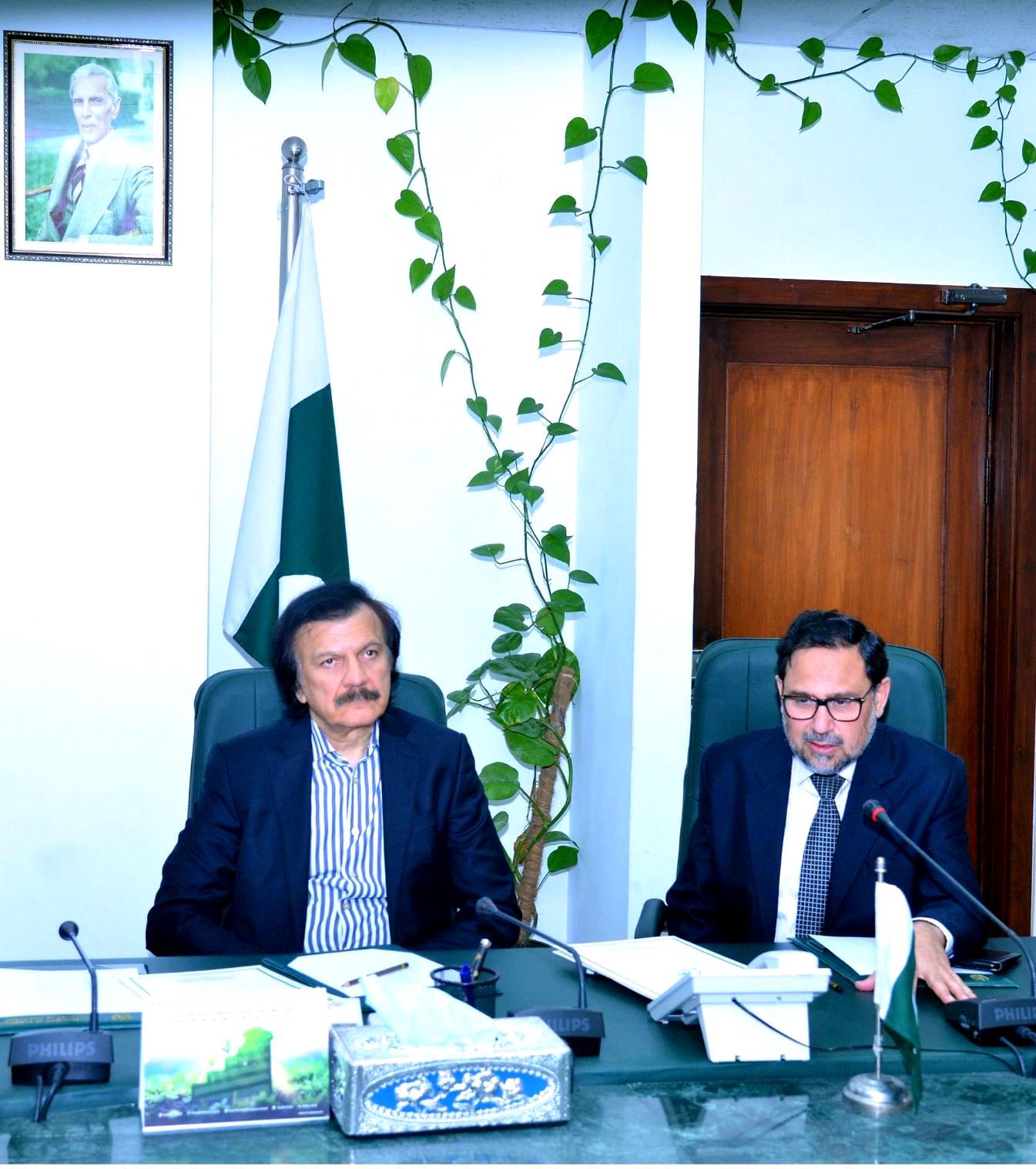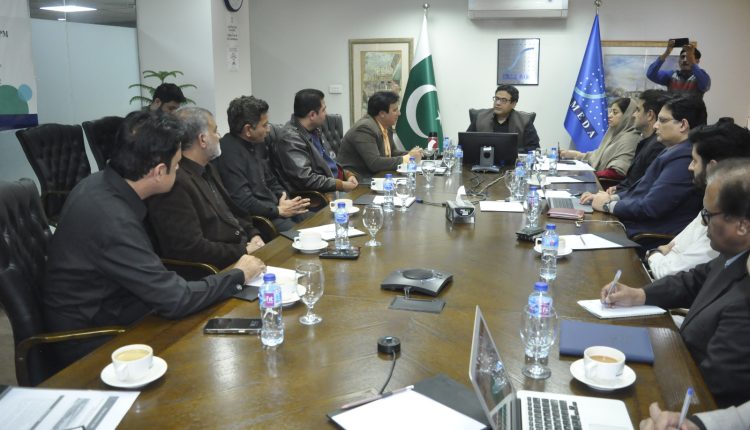SMEDA AND JICA JOIN HANDS TO EMPOWER WOMEN ENTREPRENEURS IN PUNJAB
SMEDA AND JICA JOIN HANDS TO EMPOWER WOMEN ENTREPRENEURS IN PUNJAB
The Small and Medium Enterprises Development Authority (SMEDA) and the Japan International Cooperation Agency (JICA) have signed a landmark Project Agreement to support and empower women entrepreneurs in Punjab.
The initiative, titled “Project for Capacity Enhancement of Women Entrepreneurs in the Informal Economic Sector in Pakistan,” marks a significant milestone in SMEDA-JICA collaboration.
The agreement was signed by Mr. Socrat Aman Rana, CEO SMEDA, and Ms. KOMAHASHI Rie, Head of Mission, JICA Pakistan Office. The five-year project (2026-2030) aims to develop and implement the Women Entrepreneurs Booster Package - a comprehensive support mechanism designed to accelerate business growth and build sustainable entrepreneurship among women in the informal economy.
A key feature of the initiative is the establishment of a multi-stakeholder forum, which will bring together public and private sector partners to jointly drive the development and promotion of the package. SMEDA will work with public and private sector to develop it into a key initiative for women entrepreneurship in Punjab.
Welcoming the JICA delegation, Mr. Socrat Aman Rana emphasized the project's critical role in fostering inclusive economic development. He expressed gratitude for JICA’s continued support, stating, “This initiative will not only uplift women entrepreneurs but also contribute significantly to our national economic objectives. We are confident that SMEDA, with JICA’s valuable collaboration, will achieve the desired outcomes.”
Ms. KOMAHASHI Rie expressed her enthusiasm for the partnership, noting, “We are pleased to join hands with SMEDA in this pioneering initiative. While the project poses challenges, it represents a breakthrough opportunity to address barriers faced by women micro-entrepreneurs in Pakistan’s informal sector.”
Read more: SMEDA AND JICA JOIN HANDS TO EMPOWER WOMEN ENTREPRENEURS IN PUNJAB
SMEDA, AKHUWAT FORGE PARTNERSHIP TO EMPOWER MICROENTERPRISES
SMEDA, AKHUWAT FORGE PARTNERSHIP TO EMPOWER MICROENTERPRISES
In alignment with Prime Minister Shehbaz Sharif’s vision for inclusive economic growth through grassroots entrepreneurship, the Small and Medium Enterprises Development Authority (SMEDA) has signed an MoU with Akhuwat Islamic Microfinance (AIM) to promote access to finance, formalization, and capacity building for microenterprises across Pakistan.
The MoU was signed by Socrat Aman Rana, CEO SMEDA, and Dr Amjad Saqib, Founder and Chairman of Akhuwat Foundation, at a ceremony held in Lahore.
Federal Secretary for Industries and Production Saif Anjum, along with senior representatives from AIM, the Pakistan Microfinance Network (PMN), and SMEDA’s Microenterprise Policy & Program Design (ME P&PD) team, were present.
In his keynote address, Secretary MOIP Saif Anjum emphasized the critical role of MSMEs in driving economic resilience, employment, and innovation. “Microenterprises and SMEs are at the forefront of the Prime Minister’s economic agenda. A high-level steering committee, chaired by the Prime Minister himself, is actively working to address their challenges,” he stated.
Welcoming the guests, CEO SMEDA Socrat Aman Rana highlighted the strategic objectives of the collaboration, calling it “a concrete step toward realizing the Prime Minister’s vision of a dynamic and equitable entrepreneurial landscape.” He acknowledged the vital support of the Special Assistant to the Prime Minister in bringing the partnership to fruition and aligning institutional efforts.
He noted that the microfinance sector now serves nearly 12 million active borrowers, backed by a gross loan portfolio of Rs644 billion - with women comprising 46pc of borrowers. He identified key financing areas such as trade, livestock, and agriculture as central to the MSME ecosystem, particularly in rural and semi-urban regions. Despite this progress, he emphasized the ongoing need to bridge financing gaps and formalize underserved sectors.
Dr Amjad Saqib reaffirmed Akhuwat’s dedication to the partnership, expressing confidence that the collaboration with SMEDA would significantly enhance microenterprises’ access to finance nationwide. He underscored Akhuwat’s commitment to supporting sustainable MSME development as a pathway to inclusive economic progress.
This partnership marks a significant milestone in strengthening Pakistan’s microenterprise landscape through coordinated efforts in financing, capacity building, and institutional support, he said.
SPECIAL ASSISTANT TO THE PRIME MINISTER HAROON AKHTAR KHAN REVIEWS REVAMP OF SMEDA STRUCTURE

Prime Minister’s Special Assistant, Mr. Haroon Akhtar Khan, held a high-level meeting to discuss the restructuring of the Small and Medium Enterprises Development Authority (SMEDA) with a focus on increasing the role of the private sector and improving the overall business environment in Pakistan.
The meeting emphasized the need to minimize public sector intervention in SMEDA operations, aiming to promote a more dynamic and independent role for private stakeholders in driving SME growth.
A foundational agreement was reached on enhancing the contribution of the private sector to SME development. Participants agreed on the importance of reducing government control while establishing a sustainable support mechanism for SMEDA to ensure long-term viability.
Strategic consultations with the State Bank of Pakistan were also discussed, particularly regarding the resolution of persistent SME financing challenges. The development of a practical and result-oriented SME financing strategy was a key point of discussion.
A new operational model for SMEDA is currently under development, backed by a comprehensive five-year strategic framework. This model seeks to align SMEDA’s functions with market needs and improve its effectiveness in facilitating SME growth.
It was agreed that greater private sector involvement and a redefined structural approach will enhance SMEDA’s ability to support small and medium enterprises across the country. The proposed changes are expected to significantly improve the business climate and create new opportunities for entrepreneurship and innovation.
SMEDA HOLDS PRE-BUDGET CONSULTATIVE SESSION
The SME stakeholders have called for minimizing duties to 3%, implementing single-digit taxes on SMEs, reducing sales tax to a single digit, and lowering interest rates on loans to a range of 10%-15%. Such proposals were discussed at the first pre-budget consultative session held by the Small and Medium Enterprises Development Authority (SMEDA) at SMEDA head office for federal budget 2024-25.
The objective of the session was to engage with stakeholders and gather recommendations to shape the fiscal policy of the country, particularly focusing on incentivizing SME growth, promoting new enterprise creation, and enhancing the scale of businesses across Pakistan.
General Manager of Policy & Planning SMEDA, Ms Nadia Jahangir Seth opened the session with an overview of SMEDA’s unwavering commitment to serving as a bridge between the SME sector and the government. She emphasized SMEDA & #39’s role as the apex SME development body and highlighted the importance of continued collaboration between stakeholders to drive inclusive economic growth and prosperity for SMEs in the country.
During the session, stakeholders from various sectors including the Federation of Pakistan Chamber of Commerce & Industry (FPCCI), Lahore Chamber of Commerce & Industry (LCCI), Quetta Chamber of Commerce and Industry (QCCI), Sarhad Chamber of Commerce and Industry (SCCI), Women Chambers of Commerce & amp; Industry (WCCI) and other private sector representatives actively participated in discussions and deliberations and provided valuable input for framing proposals for tax facilitation and business growth. A wide array of recommendations and challenges were discussed, reflecting the diverse needs and concerns of the SME sector.
Key recommendations focused on tax policies, burden on businesses viz-z-viz compliance, and the urgent need for government support. Stakeholders advocated for minimizing duties to 3%, implementing single-digit taxes on SMEs, reducing sales tax to a single digit, and lowering interest rates on loans to a range of 10%-15%. Additionally, stakeholders highlighted the detrimental impact of smuggling on law-abiding SMEs and proposed measures to tackle red tape at all levels.
The session also underscored the importance of strategic planning for fiscal policy, with an emphasis on solutions-oriented approaches to address challenges. The stakeholders also emphasized the need for streamlining documentation processes for businesses to facilitate ease of doing business.
Furthermore, representatives of various stakeholders including Zaki Eijaz, Vice President FPCCI, Sajjad Afzal, Convener LCCI Standing Committee, Tanveer Barry, Vice President KCCI, Asfandyar Farrukh, Chain Store Association of Pakistan and others also emphasized the significance of a long-term fiscal policy roadmap aligned with political and IMF programmes. Discussions centred on the need for reassessing the current economic vision and the importance of industry mapping to identify key areas for intervention and growth.
Earlier, SMEDA proactively solicited proposals from SME stakeholders nationwide, focusing on fiscal measures, direct and indirect taxes, compliance issues, and federal and provincial levies. These proposals will be submitted to the Ministry of Industries and Production, Ministry of Finance, and Federal Board of Revenue for inclusion in the federal budget 2024-25.
SMEDA remains dedicated to facilitating further engagement with the business community through on ground and online sessions, ensuring that the voices and concerns of SMEs are heard and addressed properly in Policy making corridors.
SMEDA CONDUCTS CONSULTATIVE SESSION TO ALIGN 2ND PHASE OF INDUSTRIAL STITCHING UNITS PROJECT WITH URAAN PAKISTAN

The Small and Medium Enterprises Development Authority (SMEDA) held a consultative session with stakeholders of the Textile Garments Manufacturing sector in order to align the 2nd Phase of its “Industrial Stitching Units project with the Uraan Pakistan program of the government for boosting exports through SMEs.The session was presided over by Mr. Socrat Aman Rana, Chief Executive Officer of SMEDA and was attended by a number of the private sector stakeholders including the representatives from APTMA, PRGMEA and PHMA. The representatives of the Ministry of Industries and Production and the Ministry of Planning, Development and Special Initiatives also attended the meeting through video link.
CEO SMEDA Mr. Socrat Aman Rana, while welcoming the participants, informed that the project titled as 1000 Industrial Stitching Units was approved by the government in 2018 to provide Matching Grants (60:40) in the cost of machines to new business startups as well as existing small & medium enterprises (SMEs) to establish industrial stitching units. The first phase of the project, building a success story, would be completed on June 30, 2025 and SMEDA was actively engaged in shaping up PC-1 for Phase-II in line with Uraan Pakistan’s objectives, he said adding that in Phase-II, 350 units shall be established, whereas in Phase-1 the target was 150 units. He further informed that under Phase-II of the project, 100% grants will be disbursed to Export-oriented units, in contrast to Phase-I, which primarily catered to domestic garment sector. The Grant size for phase-II has also been increased from Rs. 1.8 Million to Rs. 5.0 Million supporting approximately 50 machines, capable of handling export orders, he added.
Project Director Mr. Muhammad Raza, while giving a presentation on this occasion, informed that under Phase-I, 150 units had been facilitated across the country having 76 in Punjab, 35 in Sindh, 17 in KP & Baluchistan and 1 in GB. He also shared the impact assessment of 93 units established under Phase-I. He told that Phase-I of the project had a favorable impact on employment generation by creating 1208 new jobs and also empowering women entrepreneurship, as 41% of the total beneficiaries were the stitching units owned by females.
The participants of the private sector acknowledged that first phase of the Industrial Stitching Units Project of SMEDA was highly beneficial for small and medium manufacturers of the textile garments. They appreciated the transparency of the grant sanctioning process as well as technical support provided by SMEDA. They gave a number of viable suggestions for phase-11 of the project.
This is notable that Phase-II shall cater multiple textile export sectors i.e. Readymade Garments, Fashion Apparel, Hosiery Manufacturers, Knitwear, Bedsheets, Traditional Textiles Leather Garments, Denim Manufacturers, Gloves Manufacturers, Towel Manufacturers, Sports Goods, Canvas Manufacturers, unlike Phase-I, which was suitable mainly for Hosiery (Tee Shirts, Polo Shirts, Dress Shirts) and Basic Home Textile.

